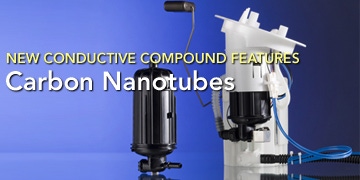March 27, 2009

A brand-newplastic compound uses carbon nanotubes to achieve electrical conductivity.
Bosch engineersare the first to specify the new material, UltraformN2320 C, a polyacetal from BASF. It willbe used in a fuel filter housing for the Audi A4 and A5 where SAE standardJ1645 (version of August 2006), requires a conductive material.
The SAEstandard recommends a maximum specific volume resistance of 106 ohm/cm formaterials that will be used in components through which fuel flows. Undermeasuring conditions according to ISO 3915 (four-point method), the conductiveUltraform attains a value of a mere 30 ohm/cm, making it 30,000 times moreconductive than necessary.
Thiseliminates the risk of electrostatic charging and sparking as fuel flowsthrough the filter.
The new Ultraform is said to retain its polyacetalproperties such as toughness, dimensional stability and elastic resilience. BASFsays when this material comes into contact with fuels, it is stronger andmore creep-resistant than conventional polyacetal.
Carbon nanotubesare fixed in the plastic matrix. The cylindrical carbon molecules have novelproperties that make them well suited for electronics and other applications. Theyfeature great strength and unique electrical properties, and are efficientconductors of heat.

New Conductive Compound Features Carbon Nanotubes A
About the Author(s)
You May Also Like





